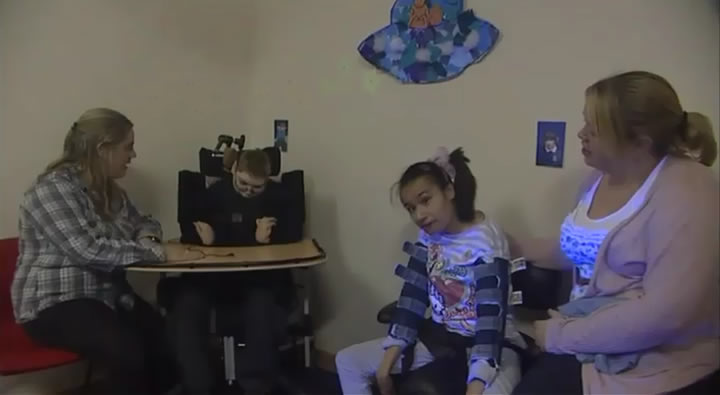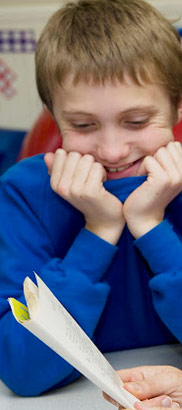
The use of sensory stories for those with PMLD is a long-established
method of delivering literacy. Sensory stories are
excellent vehicles for delivering whole school or class thematic topics
in an interesting and exciting way that is also developmentally sympathetic.
There are countless stories that can be adapted and they don't have to be
confined to standards such as Handa's Surprise and We're Going on a Bear Hunt. These
are both brilliant stories for delivering in a sensory story mode, and it's
the elements of these (a basic scene that's varied and repeated through
several episodes, building to a climax) that can be re-modelled for other
stories.
It's possible for them to be used with older children, but they are essentially
for younger children and it's important to recognise this.
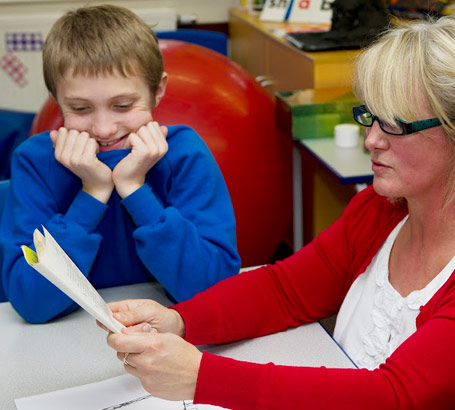
Once devised, the same story should be repeated weekly for at least half
a term, so that children have a real opportunity to become familiar with
it. They can practice sequencing, turn-taking, and improve their anticipatory
and memory skills –
all essential base elements
of communication.
There's no reason why secondary aged children should not be involved in
sensory stories. They don't need to be childish – you can make them as gory,
disgusting and naughty as you like.
Performance is an excellent thing to do, but it should not be about the
teacher being a great director, choreographer, graphic designer or musical
arranger. It should be about children working as actors, dancers, artists,
or musicians.
The arts, perhaps more than any other area of learning, give tremendous
opportunities for having fun and therefore stimulating the
learning process.
We're Going on a Bear Hunt is one of those classic tales for children that has all the essential elements for a good story. But it doesn't have to be told as a story in the sense of following the pictures and words in a book, because it's very simple to adapt into a piece of drama.
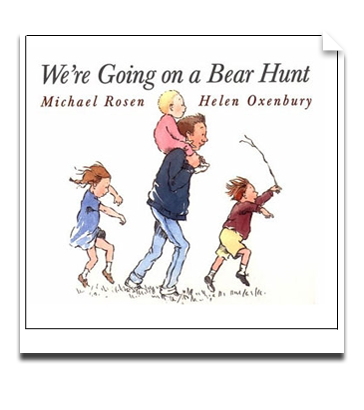
As this is about teaching children with severe learning difficulties, plan to spend at least an hour a week over at least a term, because we know that for those with SLD, repetition is the key to learning. And, as this section is on the creative arts in general rather than drama in particular, think how you might bring in other elements of the arts such as dance, art and music, which will aid storytelling in a dramatic form.
Finally, what do you think the children in your class will gain from this?
Surely learning (for those with severe learning
difficulties) is most effective when it takes place in contexts which
allow pupils to see the relevance and application of what they are learning:
contexts which mirror reality as closely as possible?
Byers, 1994
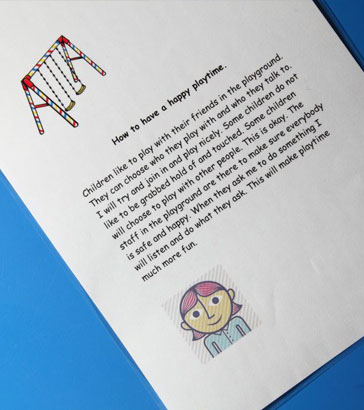
In other words, what better way to learn about being part of group with
a common goal, having a collective spirit of adventure, being looked after
and protected, being frightened, going from danger to safety and then being
kept safe?
For those with severe learning difficulties, learning is most effective
when it takes place in situations which are actually real or, if that's
not possible (and being chased by a real bear might be stretching risk assessments
just a little too far), drama allows us access to contexts which 'mirror
reality as closely as possible'.
Drama, dance, music and art are more sophisticated extensions of play and
games playing. It's not necessary to be strict about divisions. Lots of
early developmental games such as 'the farmer in the den' can be made into
full-scale dramas, so that pupils can experience what it's like to be the
farmer, wife, child and dog.
Any story is open to becoming a piece of drama, or something that can be
translated into movement, music or art. Vygotsky (1978) points out that
as children get older, their reliance on props such as sticks, dolls and
other toys diminishes.
They have internalised these pivots as imagination and abstract concepts
through which they can understand the world, so that imagination in adolescents
might become play without props. A small child might take up a broom to
gallop around on, but later needs only their imagination to represent the
horse.

Byers, R. (1994) Teaching as Dialogue: Teaching Approaches and Learning
Styles in Schools for Pupils with Learning Difficulties in Coupe-O'Kane,
J. and Smyth, B. (eds) Taking Control, London: David Fulton.
Vygotsky, L.S. (1978) Mind in Society: the Development of Higher Psychological
Processes. Cole, M. et al. (ed),
Harvard University Press.
Peter, M. (1998) Good for Them, or What? The Arts and Pupils with SEN, British
Journal of Special Education.
